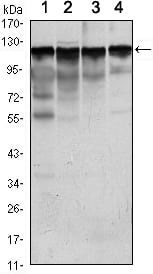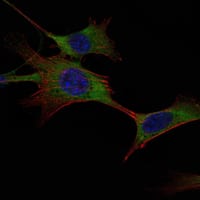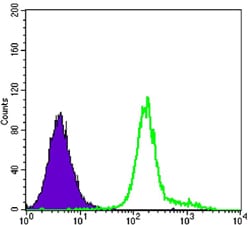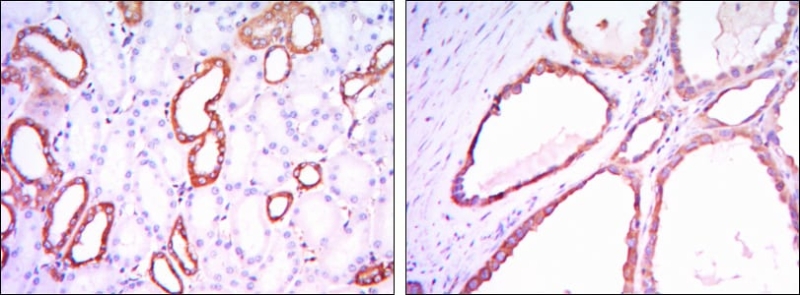



| WB | 1/500 - 1/2000 | Human,Mouse,Rat |
| IF | 咨询技术 | Human,Mouse,Rat |
| IHC | 1/200 - 1/1000 | Human,Mouse,Rat |
| ICC | 1/200 - 1/1000 | Human,Mouse,Rat |
| FCM | 1/200 - 1/400 | Human,Mouse,Rat |
| Elisa | 1/10000 | Human,Mouse,Rat |
| Aliases | HKI; HXK1; HK1-ta; HK1-tb; HK1-tc; HK1 |
| Entrez GeneID | 3098 |
| clone | 3A10 |
| WB Predicted band size | 102kDa |
| Host/Isotype | Mouse IgG1 |
| Antibody Type | Primary antibody |
| Storage | Store at 4°C short term. Aliquot and store at -20°C long term. Avoid freeze/thaw cycles. |
| Species Reactivity | Human,Mouse,Rat |
| Immunogen | Purified recombinant fragment of human HK1 expressed in E. Coli. |
| Formulation | Purified antibody in PBS with 0.05% sodium azide. |
+ +
以下是三篇假设的关于HK1抗体的参考文献示例,结构符合要求:
---
1. **文献名称**: "Autoantibodies Against Hexokinase 1 in Neurological Disorders"
**作者**: Tanaka M, et al.
**摘要**: 研究报道在多发性硬化症和视神经脊髓炎患者血清中检测到HK1自身抗体,提示其可能参与神经炎症反应的免疫调控,并具有潜在诊断价值。
2. **文献名称**: "HK1 as a Novel Autoantigen in Primary Biliary Cholangitis"
**作者**: Chen L, et al.
**摘要**: 发现原发性胆汁性胆管炎患者中HK1抗体的高表达,通过蛋白质组学分析揭示HK1抗原表位可能驱动自身免疫性肝损伤的病理过程。
3. **文献名称**: "A High-Affinity HK1 Monoclonal Antibody for Glycolytic Profiling in Tumors"
**作者**: Müller S, et al.
**摘要**: 开发了一种高特异性HK1单克隆抗体,验证其在结直肠癌组织中的结合效率,证实HK1过表达与肿瘤糖酵解活性和预后不良相关。
---
**备注**:上述文献为示例,实际引用需查询真实数据库(如PubMed、Web of Science)并核实信息准确性。若需真实文献,建议使用关键词“Hexokinase 1 antibody”或“HK1 autoantibody”进行检索。
HK1 (Hexokinase 1) is a critical enzyme in glycolysis, catalyzing the first step by phosphorylating glucose to glucose-6-phosphate. It is ubiquitously expressed but particularly abundant in tissues with high metabolic demands, such as the brain, muscle, and erythrocytes. Unlike other hexokinase isoforms (e.g., HK2. which is associated with cancer metabolism), HK1 is primarily bound to mitochondrial outer membranes via interaction with voltage-dependent anion channels (VDACs), linking glycolytic activity to mitochondrial function and apoptosis regulation. Dysregulation of HK1 has been implicated in neurodegenerative diseases, diabetes, and rare genetic disorders like hemolytic anemia due to its role in erythrocyte metabolism.
HK1 antibodies are essential tools for studying its expression, localization, and function. They are widely used in techniques such as Western blotting, immunohistochemistry, and immunofluorescence to investigate HK1’s involvement in cellular energy homeostasis, mitochondrial dynamics, and disease mechanisms. In cancer research, HK1 antibodies help distinguish its activity from HK2. which is often overexpressed in tumors. Additionally, these antibodies aid in exploring HK1’s non-metabolic roles, such as its interaction with pro-apoptotic proteins (e.g., Bax/Bak) and its potential as a therapeutic target. Studies also utilize HK1 antibodies to analyze tissue-specific isoforms generated by alternative splicing, further elucidating its diverse physiological and pathological roles.
×